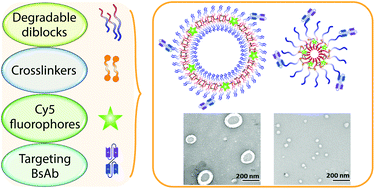Development of targeted micelles and polymersomes prepared from degradable RAFT-based diblock copolymers and their potential role as nanocarriers for chemotherapeutics†
Abstract
Modern polymerisation techniques allow synthesis of functional block copolymers that can self-assemble into degradable nanoparticles (NPs) of different sizes and conformations. These polymeric platforms have great potential in delivering anticancer drugs in a targeted and controlled manner while reducing the side effects commonly associated with the free drugs due to their modified biodistribution and pharmacokinetic profiles. Here we have terpolymerised 2-methylene-1,3-dioxepane (MDO), vinyl acetate (VAc) and vinyl bromobutanoate (VBr) by reversible-deactivation radical polymerisation (RDRP) to form amphiphilic block copolymers that contain degradable units within the vinyl backbone. Following azidation of the bromine groups and self-assembly, we were able to form crosslinked yet degradable micelles (∼25 nm) and polymersomes (∼100 nm) encapsulating doxorubicin (DOX). Each system was able to retain DOX efficiently at physiological pH, while demonstrating higher DOX release rates once the nanomaterial was destabilised under acidic conditions. In vitro cytotoxicity assays using nascent NPs confirmed the high biocompatibility of our systems when exposed to MDA-MB-468 breast cancer cells, whereas DOX-loaded NPs exhibited enhanced cytotoxicities, with IC50 values greater than that of free DOX due to the controlled release from the carriers. Subsequent conjugation of our NPs with bispecific antibodies (BsAbs) that attach to the nanoparticle surface via an anti-PEG arm, led to targeted systems that show high affinity toward epidermal growth factor receptor (EGFR) upregulated on cancer cells. In vitro imaging and cellular association studies confirmed the enhanced binding and increased DOX accumulation within cellular nuclei when targeted systems were used. Overall, polymersomes demonstrated an enhanced ability to avoid non-specific binding while maintaining higher stability over prolonged durations. However, micelles demonstrated markedly higher encapsulation efficiencies of the drug (EE% ∼80) compared to polymersomes (EE% ∼30), as well as faster release rates of their payloads once rapidly endocytosed by cancer cells. These results highlight the different capabilities of these nanocarriers as main-chain degradable chemotherapeutic delivery systems.



 Please wait while we load your content...
Please wait while we load your content...